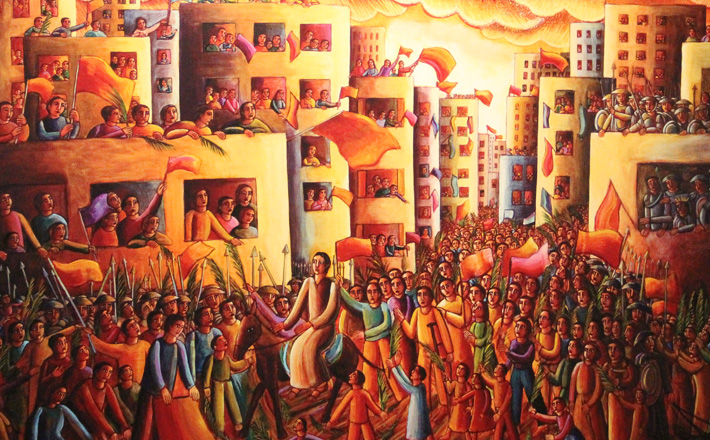Commentary on Isaiah 50:4-9a
Isaiah 50:4-9a is part of a larger poem that extends to 50:11.
Its subject is a servant of God (50:10), who speaks of his life in God’s service with both pride and pugnacity. The poem begins with his boast of being attentive to the word of God (verse 4), and he proclaims that his calling is “to sustain the weary with a word.” Then the poem takes a surprising turn: “I gave my back to those who struck me, and my cheeks to those who pulled out the beard; I did not hide my face from disgrace and spitting” (verse 6).
This poem is in that portion of Isaiah (chapters 40-55) written in the final years of the Babylonian exile, so speaking a message of comfort to the weary exiles of that time would seem to be a compelling and attractive calling. Inviting torture is less so. And yet this servant, suffering so horribly, goes on to declare, “The Lord God helps me, therefore I have not been disgraced…” (verse 7a) and “he who vindicates me is near…” (verse 8a), all the while daring those who would oppose him to come forward and confront him!
He is a compelling and strong character, whose dignity and ferocity are at odds with his beaten visage, and the prophet of Second Isaiah offers him to the people in exile as a powerful symbol of courage and hope in the midst of profound suffering. Indeed, the prophet offers the model of the servant to the people and calls them to be like him — to understand their own suffering as he does — rooted in the call to be faithful servants of God.
There are several poems in Isaiah 40-55 whose focus is this individual whom God calls “my servant.” These include 42:1-9; 49:1-7; 50:4-11; and 52:13-53:12. While there has been a tendency to view these poems as sounding a distinct note within Second Isaiah and excising them from their context, contemporary scholarship has moved away from this treatment of the servant poems and made solid arguments for regarding them as integral to Second Isaiah’s work and message.
Understood within the context of Second Isaiah, the servant poems are best seen as part of the prophet’s effort to inspire and transform the people in exile from seeing themselves as helpless slaves of Babylon (see Isaiah 49:7) to servants of God, endowed with dignity and purpose. This commentary is not the place for a comprehensive study of the imagery of the servant in Second Isaiah, but a few notes on servant imagery within the book might be helpful:
No Name
The servant of God is never given a name in these poems, suggesting that the poems about the servant are not descriptions of a historical individual (or, at least, are not only descriptions of an actual person) but are deliberately non-specific in order to allow the people to imagine themselves as the servant. When there is a particular name associated with the servant, the name is “Israel” or “Jacob” (41:8-9; 44:1-2, 21; 45:4; 48:20; 49:3, 5-6), indicating that the prophet’s intent is for the people as a whole to see themselves as the servant and not to associate the term with one particular person.
Blameless Individual
The servant of these four servant poems is a blameless individual, whose faithfulness to God is unparalleled and whose suffering is extreme (see especially 52:13-53:12). Some have argued that the servant cannot possibly be the people in exile because they were not beyond reproach, but Second Isaiah begins with the admission that the suffering of the people has exceeded the fault: “[Jerusalem] has received from the Lord’s hand double for all her sins” (40:2b).
Also consider the perspective of 52:4-5, which reads: “Now therefore what am I doing here, says the Lord, seeing that my people are taken away without cause?” The above examples demonstrate that there is room within the framework of Second Isaiah to regard the people in exile as suffering undeservedly.
Babylon?
The people to whom the prophet writes were living in exile, but there is only a single mention of the people serving Babylon in Second Isaiah. In fact, Babylon is not even mentioned by name in that single text: “Thus says the Lord, the Redeemer of Israel and his Holy One, to one deeply despised, abhorred by the nations, the slave of rulers” (49:7a).
The Hebrew word translated “slave” here is the same word translated as “servant” in the texts that speak of God’s servant in the rest of Second Isaiah. Considering the fact that the people in exile were under the control of Babylon, it is surely significant that the prophet does not speak of their lives and their labor as belonging to anyone but God. As God’s own servant, the people are divinely called and empowered, and they will ultimately be vindicated (42:1, 6-7; 43:10; 44:1-5; 49:1-6; 50:4, 7-9; 52:13, 53:5, 10-12).
Reading Isaiah 50:4-9a in light of the servant imagery we find throughout Isaiah 40-55 highlights the fact that the servant is not to be viewed simply as a description of a particular person in history. Open ears, learned and sustaining speech, a staunch faith and a willingness to suffer are the hallmarks of the ideal servant of God. God’s calling to be “my servant” is issued to the people in exile, struggling to maintain their identity as God’s own people in the midst of the Babylonian empire. It is a powerful calling, and it issues through the ages to Judea in first century ce and to us as well.
This poem is, of course, the Old Testament reading for this Sunday, which is the Sunday of the Passion. This text will serve as background for most sermons delivered this Sunday, but it is my hope that it will deepen our sense of gratitude for the one we profess as Christians to have fulfilled the calling to be God’s servant in the truest sense.
I hope that gratitude is not the only response to this servant song and to the story of the Passion, however. In both the Passion of Christ and the suffering of the servant of God in Second Isaiah, a call is issued. The call is not to a life of ease but to a life in the service of God, grounded in our faith. May our ears ever be open to the word of God and our mouths ever ready to speak a word of comfort. May our faces never be hidden out of fear or shame because the God “who vindicates me is near.”


March 24, 2013